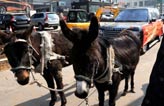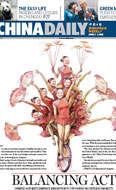People
It's a jungle out there - and 'Tiger Moms' know it
Updated: 2011-03-27 07:56
By Matt Hodges (China Daily)
|
Amy Chua (middle) with her two daughters in their Connecticut home. Lorenzo Ciniglio / For China Daily |
SHANGHAI - Amy Chua's controversial bestseller "Battle Hymn of the Tiger Mother", in which she relates her "traditionally Chinese" way of raising her two daughters in the United States, has sparked a public backlash. But I'm not joining the witch-hunt just yet.
Miss Chua, a Chinese-American Yale Law professor, adopted a strict disciplinarian approach to parenting that saw sleepovers forbidden, and one of her daughters deprived of water until she had mastered a complex piano concerto, among other measures.
In other words, this she-tiger clearly lost her sense of perspective at times, and in the process crossed various psychologically dangerous lines - lines that may have left her daughters traumatized for life.
However it is worth noting that, while Miss Chua's younger daughter rebelled - the trigger that, presumably, prompted the self-questioning that led to this rites-of-passage memoir - the other one wrote a public letter to the New York Post defending her mom's approach.
By the same token, I would argue that parents and teachers in England, where I come from, seem to have got a little too soft over the years. My favorite teachers from school, and the ones who got the best out of me, were always the ones I was most terrified of.
But it takes a combination of good parents and good teachers to see their kids make the grade, not only in school, but also in life. As I recall, it wasn't my mum banning sleepovers that made my math grades shoot up from Ds to As (although she did make me switch schools and request extra homework, which was the first step).
The crux, though, was having a teacher who knew how to humiliate me in class for not paying attention, while at the same time making these incredibly complex algebraic equations seem easy, fun and, most importantly, within my grasp.
Kids, as they say, are sponges for absorbing information, and what a shame to waste those golden years. I wish my mum had been stricter with me, or had the foresight to make me learn Chinese, or Portuguese, on the weekends when I was at junior school, even if it meant throwing my ZX Spectrum 48K away.
Obviously I would have thrown a tantrum, but how far did mastering Jet Set Willy really get me in life? And wouldn't I rather be going out with my mates this evening discussing life and work, rather than sitting at home memorizing indecipherable hieroglyphics that are 10 times harder to absorb now than would have been the case.
There is even Darwinian logic to the term "Tiger Mom". It chimes with other phrases we use (not arbitrarily) to describe modern-day society, such as "it's a jungle out there" and "job hunting." Tigers should, theoretically, sit at the top of the food chain. What Chua overlooked is that kids need just as many "soft" skills as "hard" skills to survive the modern urban jungle, both professionally and emotionally.
 |
They also need to chill out sometimes and just be kids. It's all about balance. And so far it seems like neither East nor West has got it perfect. On the plus side, there are lessons that each side can learn from the other.
When I encounter these pre-adolescent kids on the streets of Shanghai who can already chat with me in decent English, it just blows my mind. Same for how I felt watching a music recital in Hangzhou, near Shanghai, a few years back. As our group watched a group of nine-year-old girls play the zheng (21-stringed zithers) in perfect harmony, one Venezuelan housewife turned to me with a look of horror on her face and said, "Oh my god, isn't it terrible? Whatever happened to their childhood?"
I was equally shocked by her response. The main thought racing through my mind was, "Wow!" Shortly followed by "Do these kids need a manager?" Then, "We (i.e. the West) are in serious trouble." Chinese kids often seem streets ahead of us academically, especially linguistically and mathematically.
What I didn't realize, and the point that is highlighted by Chua's book, is that many of them achieve this under extreme levels of parental duress. That, as they say, is the Chinese way. However there must be a middle path. It certainly wouldn't have killed me to put in a few hours' extra work on my Saturdays or Sundays.
The key seems to be: not blowing a gasket if your kid brings home a B or C grade, especially if he's a boy. Whereas girls are generally more obedient, and may respond better to elements of a watered-down Tiger Mom approach, boys have this thing called testosterone. It makes us different. It led to the creation of the NBA.
Another danger of Chua's model, if applied purely, is that it creates a world where having a 720 GMAT score - considered very high outside China - is suddenly considered just average on the mainland, thus rendering the achievement increasingly obsolete. It risks building a dull and homogenous society.
In sum, Chinese parents need to remember that not every kid was born to be a scientist, a lawyer or a CEO, and that socializing, or playing sports, can bring benefits (not least of which is business networking in later life, and understanding the rules of fair play).
Meanwhile, Western moms and dads may want to crack the whip a little harder, lest their offspring likes the idea of working in Burger King at age 35, while the top end of the job market gets swamped by a multilingual Chinese workforce "roaring" to go.
Culture Matters is a cross-cultural bilingual talk show on International Channel Shanghai (ICS), airing every Sunday from 7 to 8 pm. Readers can also view the program online at www.smgbb.cn.
E-paper

Rise and shine
The Chinese solar energy industry is heating up following recent setbacks in the nuclear sector
Preview of the coming issue
Bombs aim for regime change
CSI, with a twist
Specials

The queen of panda cubs
Spanish Queen Sofia laughs as she plays with a panda.

London's Olympic Stadium
Construction on the flagship stadium for the 2012 London Olympics was completed Tuesday.

Donkey-powered Land Rover
Two donkeys pull a broken-down Land Rover in Shenyang, Liaoning province.

